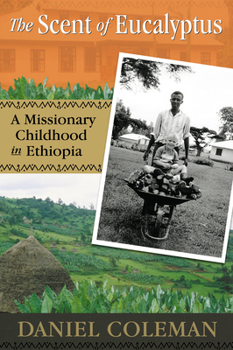The Scent of Eucalyptus: A Missionary Childhood in Ethiopia
The fair-haired child of Canadian missionary parents, Daniel Coleman grew up with an ambivalent relationship to the country of his birth. He was clearly different from his Ethiopian playmates, but because he was born in Ethiopia and knew no other home, he was not completely foreign. Like the eucalyptus, a tree imported to Ethiopia from Australia in the late 19th century to solve a firewood shortage, he and his missionary family were naturalized transplants. As ferenjie, they endlessly negotiated between the culture they brought with them and the culture in which they lived. In The Scent of Eucalyptus , Coleman reflects on his experience of "in-between-ness" amid Ethiopia's violent political upheavals. His intelligent and finely crafted memoir begins in the early 1960s, during the reign of Haile Selassie. It spans the king's dramatic fall from power in 1974, the devastating famines of the mid-1970s and early 1980s, and Mengistu Haile Mariam's brutal 20-year dictatorship. Through memoir and reflection, The Scent of Eucalyptus gives a richly textured view of missionary culture that doesn't yield to black-and-white analysis.
Format:Paperback
Language:English
ISBN:0864923740
ISBN13:9780864923745
Release Date:September 2003
Publisher:Goose Lane Editions
Length:300 Pages
Weight:0.95 lbs.
Dimensions:0.7" x 5.9" x 9.2"
Customer Reviews
2 ratings
The scent of Eucalyptus: A Missionary Childhood in Ethiopia
Published by Thriftbooks.com User , 16 years ago
For those interested in learning about (or reliving) both the costs of growing up as an MK and the special joys that this experience brings would be well-served to read this book. Although the details may be somewhat different, the general sense of the life of "otherness" that is a product of a mish-kid upbringing is really spot-on. I believe that this story is of particular value to those families that are contemplating answering the call that their faith or their value system requires of them. A good companion/comparison book is Chameleon Days.
A Thoughtful Exploration of MK Identity
Published by Thriftbooks.com User , 20 years ago
This thoughtful and beautifully written memoir by the son of SIM missionaries is much more than an autobiography, for it delves into the complexities of identity and self-understanding that are so much a part of the experience of many missionary children. After growing up in a small village and becoming fluent in Oromifa and Amharic, Daniel makes the transition involved in attending the mission boarding school in the capital city where his primary peers are now MKs like himself. During the tumultuous years of political upheaval following the overthrow of Haile Selassie in 1974, the rising hostility toward foreigners is directed on a number of occasions to Coleman and his pink skinned friends. The discovery that he will always be a "ferinjie," or foreigner, in the land of his birth is a shattering one that makes him determined to forge a new identity and to forsake his past when he returns to Canada at the age of seventeen. From that point on he tells people he is from "Wheatley, Ontario," his Dad's home town. The book begins when Coleman returns to the land of his birth after an absence of fourteen years. Now, as an academic, he reflects on how his identity, faith and outlook on cultures have been shaped by the formative experiences of his African past. The eucalyptus symbolizes for Coleman the complex interplay of cultures. This tree, native to Australia, was transplanted to Ethiopia as a quick-growing source of firewood and building materials. Though a foreign specimen, it thrived and replaced much of the native vegetation. Like the eucalyptus, missionaries seek to flourish by negotiating between the culture they bring with them and the culture to which they have come. Coleman has an appreciation for the many facets of this interplay and is critical of some of the stereotypes of missionaries perpetuated by media and social scientists. His final chapter, "Babies in the Colonial Washtub" is a brilliant exploration of this complexity.Coleman allows his readers to enter into his own struggle to affirm the same certainties about God that he imbibed from his family during his formative years. While not afraid to voice his doubts, he maintains a genuine admiration for his parents' and his Ethiopian friends' faith, sacrifice and commitment to their task. This book is a delight to read. The author's masterful use of the English language applied to a subject that evokes deep emotion is engaging from the first page onward. Readers who are particularly interested in issues relating to the well-being of missionary children will find this extended case self-study to be very insightful.






